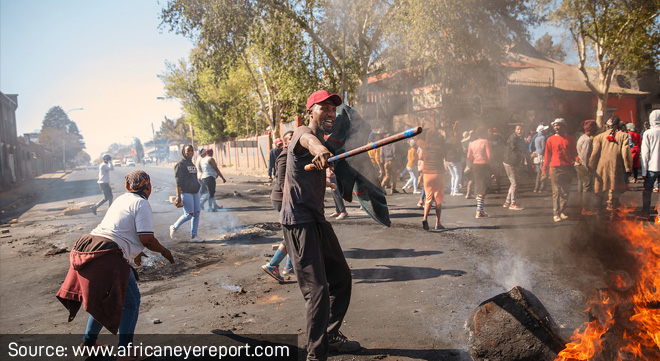The risk that South Africa may experience unrest similar to what occurred in July 2021 is increasing as a result of the impact of load shedding on jobs and the economy. This is according to security experts and the Franchise Association of South Africa (Fasa).
Fasa said this week that franchises in general were incurring debilitating financial losses because of load shedding.
In addition, franchises in the retail sector were still suffering the after-effects of the looting and rioting in July 2021 and the floods in KwaZulu-Natal.
“The sector has yet to see any significant steps taken by the government to assist those who have had to rebuild and restart from scratch with no assistance, and reports from members in the sector indicate that if steps are not taken immediately and urgently, rioting and looting is going to resume and escalate nationally. They are already seeing this happening sporadically,” Fasa said.
The association echoed warnings from the agricultural sector that food security is coming under threat, which is putting pressure on manufacturers, food growers, and meat and poultry suppliers, which are reporting massive wastage as produce goes bad because of incessant load shedding.
“This disruption in the value chain is critical to feeding the nation and cannot be ignored. The knock-on effect of producers not being able to get produce to market, coupled with retailers forced to close operations during load shedding or simply not being able to afford the cost of alternate power, will impact all communities across the country,” Fasa said.
State’s ability to combat lawlessness ‘is weak’
On Tuesday, the South African Banking Risk Information Centre (Sabric), the Cash-in-Transit Association of South Africa (Citasa), the Geopolitical Intelligence (GI Advisory) and the Institute for Security Studies (ISS) participated in a discussion about the risk that load shedding is posing to the stability of the country. The discussion was organised by the National Press Club in Pretoria.
The head of justice and violence prevention at the ISS, Gareth Newham, said load shedding affected home security systems and made people vulnerable to crime.
Statistics from some insurers indicated an increase in claims for burglaries and robberies when load shedding is scheduled – more so over weekends.
“The increases seem to be spiking as a result of load shedding. Load shedding is a very worrying factor that powers on to a number of other factors that weaken our public security situation and the ability of the state to effectively respond to that situation,” he said.
Newham said load shedding was occurring “at a time when the state is very precarious. We have not seen improvements in the police in the last five years under the current administration. The decline in the ability to solve murders, to solve armed robberies and organised crime has continued.”
There has been a significant increase in car and truck hijackings, and the state was “not able to get on top of that”.
Newham said the 2021 unrest was an example of the consequences of the state’s weakness when it came to combating crime and lawlessness.
Load shedding was forcing businesses to close, which produced more unemployment, which, in turn, could be a potential trigger for widespread violence, he said.
Newham said that if the electricity grid collapsed, law enforcement agencies would not be able to manage the scale of unrest.
‘Untraceable’ perpetrators
GIA director Lunga Dweba said he was concerned about violent protests such as those which followed the decision by the National Energy Regulator of SA to grant Eskom a tariff hike of 18.65%.
Even more concerning was the growing appetite for lawlessness “where violent acts are not talked about, but they will be implemented”.
Dweba said the July 2021 unrest was an example of violent crimes planned and executed by people who could not be traced. He did not believe the few people who had been arrested in connection with the unrest were the planners.
Cash-in-transit industry ‘working on contingency plans’
Citasa’s Grant Clark said the distribution of money during different stages of load shedding was a big concern for the cash industry, and the economy would grind to a halt in three days if the distribution of cash was brought to a standstill.
He said it has become very expensive for cash centres and branches to run security systems during load shedding.
The cash-in-transit industry was working with the banking sector to put contingency plans in place in the event of a complete blackout and how they will ensure the security of cash throughout the value chain, Clark said.
Sabric’s chief executive, Nischal Mewalall, said the Centre has been taking steps to evaluate and identify the scenarios that could develop as load shedding begins to pan out, and the mitigating measures that could be put in place.
He said one of the important scenarios Sabric has been focusing on for the past six months was the impact of stage 8 load shedding and the potential for a total collapse of the electricity grid, even if this lasts for only a short period.
If there were a blackout, Eskom has said it would take six to 14 days to restore power to the entire country.
“We looked at the impact of the operational risk, as well as the crime and security risks. The areas we focused on have been on the cash management and the availability of cash in the system.
“The second area has been the communication between bank customers, employees and stakeholders, and law enforcement agencies.”
“In terms of the grid being not available in certain areas geographically where banks are positioned, we have not seen any direct or indirect link to any crime directed towards banking infrastructure in those specific areas,” he said.
Mewalall said any decision to limit the amount of cash that could be withdrawn in the event of a total blackout would lie with the South African Reserve Bank. Banks cannot make that decision.



